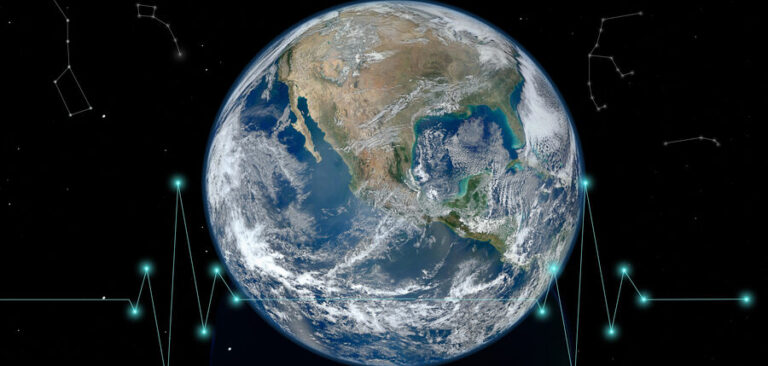The Massachusetts Institute of Technology (MIT) has found direct evidence for the continual operation of silicate weathering’s role in regulating Earth’s carbon cycle over millennia.
The study confirms that the planet harbors a “stabilizing feedback” mechanism that acts over hundreds of thousands of years to keep global temperatures within a steady, habitable range despite global volcanism to planet-cooling ice ages and dramatic shifts in solar radiation. Silicate weathering is a geological process by which the slow and steady weathering of silicate rocks involves chemical reactions that ultimately draw carbon dioxide out of the atmosphere and into ocean sediments, trapping the gas in rocks.
Scientists have long suspected that silicate weathering plays a major role in regulating Earth’s carbon cycle. The mechanism of silicate weathering could provide a geologically constant force in keeping carbon dioxide – and global temperatures – in check. However, the university has asserted that there’s never been direct evidence for the continual operation of such a feedback, until now.
The new findings are based on a study of paleoclimate data that records changes in average global temperatures over the last 66 million years. The MIT team applied mathematical analysis to see whether the data revealed any patterns characteristic of stabilizing phenomena that reined in global temperatures on a geologic timescale. They found that indeed there appears to be a consistent pattern in which the Earth’s temperature swings are dampened over timescales of hundreds of thousands of years. The duration of this effect is similar to the timescales over which silicate weathering is predicted to act. The results are the first to use actual data to confirm the existence of stabilizing feedback, the mechanism of which is likely silicate weathering. This stabilizing feedback would explain how the Earth has remained habitable through dramatic climate events in the geologic past.
The study is co-authored by Daniel Rothman, professor of geophysics at MIT, and Constantin Arnscheidt, a graduate student in the department of earth, atmospheric and planetary sciences (EAPS) at MIT. Arnscheidt said, “On the one hand, it’s good because we know that today’s global warming will eventually be canceled out through this stabilizing feedback. But on the other hand, it will take hundreds of thousands of years to happen, so not fast enough to solve our present-day issues.”
Scientists have previously seen hints of a climate-stabilizing effect in the Earth’s carbon cycle – chemical analyses of ancient rocks have shown that the flux of carbon in and out of Earth’s surface environment has remained relatively balanced, even through dramatic swings in global temperature. Furthermore, models of silicate weathering predict that the process should have some stabilizing effect on the global climate. And finally, the fact of the Earth’s enduring habitability points to some inherent, geologic check on extreme temperature swings.
Arnscheidt continued, “You have a planet whose climate was subjected to so many dramatic external changes. Why did life survive all this time? One argument is that we need some sort of stabilizing mechanism to keep temperatures suitable for life. But it’s never been demonstrated from data that such a mechanism has consistently controlled Earth’s climate.”
Arnscheidt and Rothman sought to confirm whether stabilizing feedback has indeed been at work, by looking at data of global temperature fluctuations through geologic history. They worked with a range of global temperature records compiled by other scientists, from the chemical composition of ancient marine fossils and shells, as well as preserved Antarctic ice cores.
Arnscheidt noted, “This whole study is only possible because there have been great advances in improving the resolution of these deep-sea temperature records. Now we have data going back 66 million years, with data points at most thousands of years apart.”
To the data, the team applied the mathematical theory of stochastic differential equations, which is commonly used to reveal patterns in widely fluctuating data sets. “We realized this theory makes predictions for what you would expect Earth’s temperature history to look like if there had been feedbacks acting on certain timescales,” Arnscheidt explained.
Using this approach, the team analyzed the history of average global temperatures over the last 66 million years, considering the entire period over different timescales, such as tens of thousands of years versus hundreds of thousands, to see whether any patterns of stabilizing feedback emerged within each timescale.
Rothman said, “To some extent, it’s like your car is speeding down the street, and when you put on the brakes, you slide for a long time before you stop. There’s a timescale over which frictional resistance, or stabilizing feedback, kicks in when the system returns to a steady state.”
Without stabilizing feedback, fluctuations in global temperature should grow with the timescale. However, the team’s analysis revealed a regime in which fluctuations did not grow, implying that a stabilizing mechanism reigned in the climate before fluctuations grew too extreme. The timescale for this stabilizing effect – hundreds of thousands of years – coincides with what scientists predict for silicate weathering.
Arnscheidt and Rothman found that on longer timescales, the data did not reveal any stabilizing feedback. That is, there doesn’t appear to be any recurring pull-back of global temperatures on timescales longer than a million years. “There’s an idea that chance may have played a major role in determining why, after more than 3 billion years, life still exists,” Rothman offered.
In other words, as Earth’s temperatures fluctuate over longer stretches, these fluctuations may just happen to be small enough in the geologic sense, to be within a range that stabilizing feedback, such as silicate weathering, could periodically keep the climate in check, and more to the point, within a habitable zone.
“There are two camps: some say that random chance is a good enough explanation, and others say there must be a stabilizing feedback,” Arnscheidt said. “We’re able to show, directly from data, that the answer is probably somewhere in between. In other words, there was some stabilization, but pure luck likely also played a role in keeping Earth continuously habitable.”



